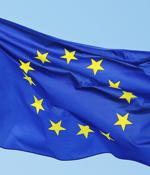Security News

A financially motivated campaign that targets Android devices and spreads mobile malware via SMS phishing techniques since at least 2018 has spread its tentacles to strike victims located in France and Germany for the first time. Dubbed Roaming Mantis, the latest spate of activities observed in 2021 involve sending fake shipping-related texts containing a URL to a landing page from where Android users are infected with a banking trojan known as Wroba whereas iPhone users are redirected to a phishing page that masquerades as the official Apple website.

The European Systemic Risk Board proposed a new systemic cyber incident coordination framework that would allow EU relevant authorities to coordinate better when responding to major cross-border cyber incidents impacting the Union's financial sector. ESRB is an independent EU body established in 2010 that oversees the European Union's financial system to prevent and mitigate systemic risk.

A ResearchAndMarkets study provides an in-depth analysis of trends, growth factors and growth opportunities in the European UCaaS market. International providers will enter the European markets and European providers will seek to expand internationally, creating new levels of competition.

The European Cybercrime Centre has again acted against credit card fraud and is poised to reveal success on a similar scale to its 2020 campaign that prevented €40 million of losses. Credit card fraud has also persisted, with crims conducting ongoing campaigns to acquire card numbers and use them to make unauthorised purchases.

Two Eastern European nationals have been sentenced in the U.S. for offering "Bulletproof hosting" services to cybercriminals, who used the technical infrastructure to distribute malware and attack financial institutions across the country between 2009 to 2015. Pavel Stassi, 30, of Estonia, and Aleksandr Shorodumov, 33, of Lithuania, have been each sentenced to 24 months and 48 months in prison, respectively, for their roles in the scheme.

It's not actually banned in the EU yet - the legislative process is much more complicated than that - but it's a step: a total ban on biometric mass surveillance. To respect "Privacy and human dignity," MEPs said that EU lawmakers should pass a permanent ban on the automated recognition of individuals in public spaces, saying citizens should only be monitored when suspected of a crime.

The EU Parliament has voted in favor of a resolution that essentially calls for the ban of AI-powered biometric mass surveillance technologies such as facial recognition systems in the continent. With today's decision, the European Parliament asks for a permanent ban on the automated recognition of individuals in public spaces, and the prohibition of predicting policing based on behavioral data.

A sophisticated telecommunications satellite that can be completely repurposed while in space has launched. Because the satellite can be reprogrammed in orbit, it can respond to changing demands during its lifetime.

Owl Labs announces its partnership with Bechtle to strengthen Owl Labs' presence within key European markets and verticals. As a result of the partnership, Owl Labs can continue to expand the reach, awareness, and adoption of its award-winning flagship product, the Meeting Owl Pro, across Europe through Bechtle's 80 locations in the DACH region and its e-commerce subsidiaries in 14 European countries, including: UK, Ireland, France, Germany, Netherlands, Belgium, Spain, Portugal, Italy, Poland, Hungary, Switzerland, Austria and Czech Republic.

Unisys Corporation announced a four-year contract to support a range of services for the European Union. In partnership with Uni Systems and Wavestone, the Unisys-led consortium will consult on the design of major European IT systems to support eu-LISA, the European Union Agency for the Operational Management of Large-Scale IT Systems in the Area of Freedom, Security and Justice.